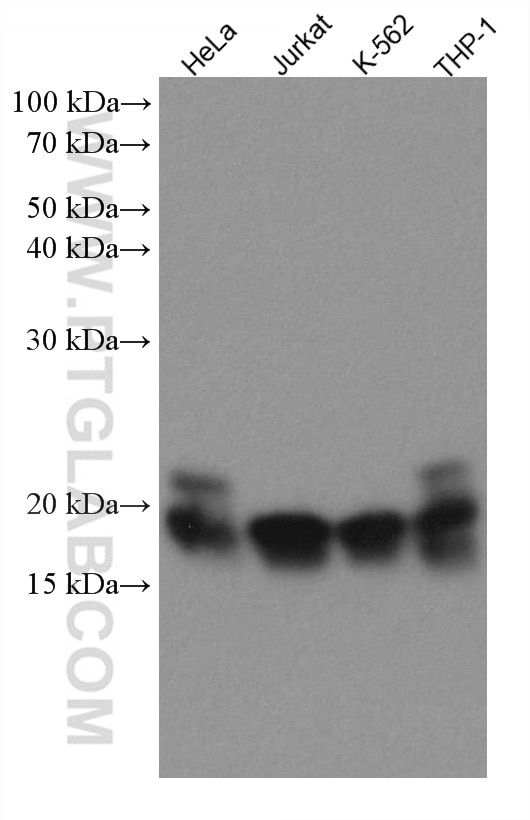TNFAIP8 Monoclonal antibody
TNFAIP8 Monoclonal Antibody for WB, ELISA
Host / Isotype
Mouse / IgG2b
Reactivity
Human
Applications
WB, ELISA
Conjugate
Unconjugated
CloneNo.
3D2F7
Cat no : 67737-1-Ig
Synonyms
Validation Data Gallery
Tested Applications
| Positive WB detected in | HeLa cells, Jurkat cells, K-562 cells, THP-1 cells |
Recommended dilution
| Application | Dilution |
|---|---|
| Western Blot (WB) | WB : 1:1000-1:4000 |
| Sample-dependent, check data in validation data gallery | |
Product Information
67737-1-Ig targets TNFAIP8 in WB, ELISA applications and shows reactivity with Human samples.
| Tested Reactivity | Human |
| Host / Isotype | Mouse / IgG2b |
| Class | Monoclonal |
| Type | Antibody |
| Immunogen | TNFAIP8 fusion protein Ag8805 相同性解析による交差性が予測される生物種 |
| Full Name | tumor necrosis factor, alpha-induced protein 8 |
| Calculated molecular weight | 198 aa, 23 kDa |
| Observed molecular weight | 19-21 kDa |
| GenBank accession number | BC007014 |
| Gene symbol | TNFAIP8 |
| Gene ID (NCBI) | 25816 |
| RRID | AB_2918506 |
| Conjugate | Unconjugated |
| Form | Liquid |
| Purification Method | Protein A purification |
| Storage Buffer | PBS with 0.02% sodium azide and 50% glycerol pH 7.3. |
| Storage Conditions | Store at -20°C. Aliquoting is unnecessary for -20oC storage. |
Background Information
TNFAIP8 (tumor necrosis factor, alpha-induced protein 8), also called SCC-S2/GG2-1/NDED, is associated with enhanced cell survival and inhibition of apoptosis. The induction of TNFAIP8 by TNF depends on the activation of NFκB. TNFAIP8 suppresses the TNF-mediated apoptosis by inhibiting caspase-8 activity but not the processing of procaspase-8, subsequently resulting in inhibition of BID cleavage and caspase-3 activation. TNFAIP8 is expressed in adult spleen, lymph node, thymus, thyroid, bone marrow, and placenta, and in fetal liver, lung, and kidney at high levels, also expressed in various tumor tissues and all cancer cell lines tested.
Protocols
| Product Specific Protocols | |
|---|---|
| WB protocol for TNFAIP8 antibody 67737-1-Ig | Download protocol |
| Standard Protocols | |
|---|---|
| Click here to view our Standard Protocols |


